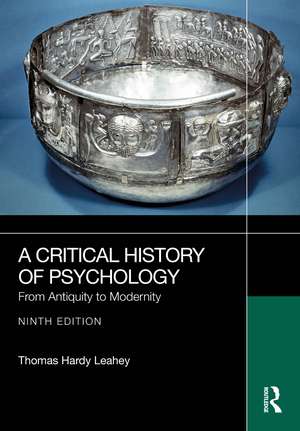A Critical History of Psychology: From Antiquity to Modernity
Autor Thomas Hardy Leaheyen Limba Engleză Hardback – 14 ian 2025
The text approaches the material from an integrative, rather than wholly linear, perspective, carefully examining how issues in psychology reflect and affect concepts that lie outside the field of psychology’s technical concerns as a science and profession.
Key features of this edition include:
- A newly reconsidered structure, including five additional interludes exploring historical background narratives and the rise of modernity, to allow for flexible and adaptable textbook use.
- Expanded exploration of the two psychologies: the Way of Ideas, driven by epistemology and unique to Europe, and The Way of Human Nature, a universal concern to find a science of human behavior and its management.
Preț: 652.77 lei
Preț vechi: 876.63 lei
-26% Nou
Puncte Express: 979
Preț estimativ în valută:
124.92€ • 129.63$ • 104.41£
124.92€ • 129.63$ • 104.41£
Carte nepublicată încă
Doresc să fiu notificat când acest titlu va fi disponibil:
Se trimite...
Preluare comenzi: 021 569.72.76
Specificații
ISBN-13: 9781032539669
ISBN-10: 1032539666
Pagini: 628
Ilustrații: 182
Dimensiuni: 178 x 254 mm
Greutate: 0.45 kg
Ediția:9
Editura: Taylor & Francis
Colecția Routledge
Locul publicării:Oxford, United Kingdom
ISBN-10: 1032539666
Pagini: 628
Ilustrații: 182
Dimensiuni: 178 x 254 mm
Greutate: 0.45 kg
Ediția:9
Editura: Taylor & Francis
Colecția Routledge
Locul publicării:Oxford, United Kingdom
Public țintă
Postgraduate and UndergraduateCuprins
Part One. Situating Psychology
Chapter 1. Introduction
Part Two. Psychology Before Psychology: Discovery of the Mind
Prelude: The World We Have Lost: EEA to 1688 CE
Chapter 2. Antiquity: Locating the Mind Within
Chapter 3. Hellenism, Feudalism, and Renaissance: Tending the Soul
Part Three. A Science of the Mind
Interlude I: Modernity in Mind and the Rise of Science: 1543 to 1915
Chapter 4. The Way of Ideas: Furnishing the Mind
Chapter 5. Psychology of Consciousness: Looking Inward
Chapter 6. Psychology of Adaptation: Looking Outward
Part Four. A Science of Human Nature
Interlude II: Modernity, its Disenchantments, and Social Policy: 1-1871
Chapter 7. Social Science before Science: Approaching the Social Problem
Chapter 8. Psychology of the Unconscious: Confronting Irrationality
Chapter 9. Psychology and Social Science: Managing Modern Life
Part Five. Two Psychologies in the Modern World
Interlude III: Late Modernity: War, Peace, War, Peace, War 1914 –
Chapter 10. Behaviorism: Ostracizing Mind
Chapter 11. Cognitive Science: Return of the Prodigal
Chapter 12. Applied and Professional Psychology: Treating the Individual
Chapter 13. The Psychological Society: Coping with (Post)Modernity
Postlude: Reflections on Psychology Today
Chapter 1. Introduction
Part Two. Psychology Before Psychology: Discovery of the Mind
Prelude: The World We Have Lost: EEA to 1688 CE
Chapter 2. Antiquity: Locating the Mind Within
Chapter 3. Hellenism, Feudalism, and Renaissance: Tending the Soul
Part Three. A Science of the Mind
Interlude I: Modernity in Mind and the Rise of Science: 1543 to 1915
Chapter 4. The Way of Ideas: Furnishing the Mind
Chapter 5. Psychology of Consciousness: Looking Inward
Chapter 6. Psychology of Adaptation: Looking Outward
Part Four. A Science of Human Nature
Interlude II: Modernity, its Disenchantments, and Social Policy: 1-1871
Chapter 7. Social Science before Science: Approaching the Social Problem
Chapter 8. Psychology of the Unconscious: Confronting Irrationality
Chapter 9. Psychology and Social Science: Managing Modern Life
Part Five. Two Psychologies in the Modern World
Interlude III: Late Modernity: War, Peace, War, Peace, War 1914 –
Chapter 10. Behaviorism: Ostracizing Mind
Chapter 11. Cognitive Science: Return of the Prodigal
Chapter 12. Applied and Professional Psychology: Treating the Individual
Chapter 13. The Psychological Society: Coping with (Post)Modernity
Postlude: Reflections on Psychology Today
Notă biografică
Thomas Hardy Leahey received a PhD in Cognitive Psychology from the University of Illinois at Urbana-Champaign under the direction of William F. Brewer. He is a Fellow of the American Psychological Association and the Association for Psychological Science. He has been President of the Society for the History of Psychology (Division 26 of APA), and Society for Theoretical and Philosophical Psychology (Division 24 of the APA). He is also author of Fundamentals of Cognitive Science and co-author (with Grace Leahey) of Psychology’s Occult Doubles: Psychology and the Problem of pseudoscience. He is Professor Emeritus of Psychology from Virginia Commonwealth University in Richmond, Virginia.
Descriere
This fully updated 9th edition places social, economic and political forces of change alongside psychology’s internal theoretical and empirical arguments. It utilises a critical lens to illuminate the way in which the external world has shaped the development of psychology and, in turn, how psychology has shaped society.
